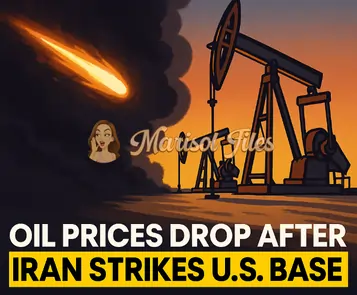Oil Prices Fall After Iran’s Retaliatory Strike on US Base in Qatar
By Inday Marisol | June 24, 2025

Table of Contents
Tensions flare in the Middle East, but oil prices drop as markets view Iran’s response as restrained
Tehran, Iran—In retaliation for US-led airstrikes on key nuclear facilities, Iran launched a missile attack on Al Udeid Air Base in Qatar on Monday. The base, which houses the largest US military presence in the Middle East, was reportedly evacuated in advance, with no casualties reported.
Iran’s National Security Council confirmed the strike, framing it as a proportional response: “The number of missiles used was the same as the number of bombs that the US had used.”
Despite rising tensions, oil prices plummeted more than 6%, with West Texas Intermediate (WTI) falling to $69.96 per barrel and Brent crude to $72.07—a sign that global markets saw Iran’s actions as measured and non-escalatory.
Trump: “Very Weak Response”
Former US President Donald Trump downplayed the Iranian retaliation on his Truth Social platform, stating:
“Iran has officially responded to our obliteration of their nuclear facilities with a very weak response… Perhaps Iran can now proceed to peace and harmony in the region.”
Trump also thanked Iran for reportedly giving early notice, which helped prevent casualties.
What This Means for the Philippines
While the missile exchange signals heightened instability in the Middle East, the immediate impact on the Philippines may be positive in the short term, particularly through lower oil prices.
1. Fuel Rollbacks Likely
The Department of Energy (DOE) is expected to announce fuel price rollbacks next week, barring any reversal in oil markets. A sustained drop in Brent crude below $75 could translate into a ₱1.50–₱2.00/liter price cut for gasoline and diesel.
2. Economic Relief Amid Inflation Pressures
Lower fuel costs would ease logistical and production expenses across industries, potentially reducing inflation pressure on food, transport, and electricity — areas where Filipino households feel the most economic strain.
3. Long-Term Uncertainty Remains
However, experts caution against over-optimism. A broader regional war — especially if Israel, Iran, and the US continue exchanging strikes — could disrupt oil shipping routes and cause volatile price spikes, affecting the Philippines’ fuel security.
“If tensions escalate in the Strait of Hormuz or involve OPEC producers, we could see prices rebound quickly,” said an economist from the Philippine Institute for Development Studies.
Qatar, Israel, and Regional Fallout
Qatar confirmed its air defenses intercepted some of the missiles, but also warned it “reserves the right to respond.” Meanwhile, Saudi Arabia condemned Iran’s strike and expressed support for Qatar.
As blasts were heard in Tehran and Doha, Israel carried out what it claimed were its most powerful strikes yet on Iranian targets, including Evin Prison and the Fordo nuclear site. Iran responded with barrages of missiles at Israel, intensifying fears of a wider regional conflict.
French President Emmanuel Macron and Chinese diplomats urged de-escalation, warning of a “spiral of chaos” that could trigger global economic consequences.
Conclusion: Philippines Must Stay Alert
While the current outcome benefits Filipino consumers through lower fuel prices, the volatile nature of Middle Eastern geopolitics means conditions can change rapidly. The Department of Foreign Affairs (DFA) and DOE are monitoring developments closely, particularly for OFWs in the Gulf region and the country’s oil import security.
Sources
- Agence France-Presse (AFP)
- Al Jazeera News
- [Truth Social – Donald Trump’s official account]
- Department of Energy Philippines – Fuel Monitoring
- MarketWatch – Crude Oil Prices

Maria Sollen Castor, known as “Inday Marisol,” is a skilled and experienced content writer. Renowned for her engaging and authentic style, she crafts compelling content that connects with readers and resonates across platforms.
